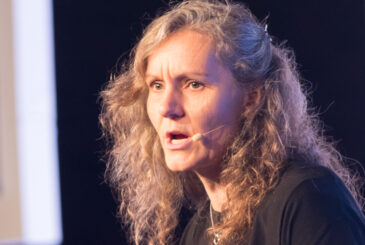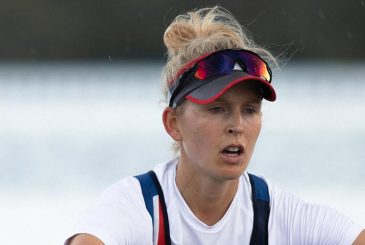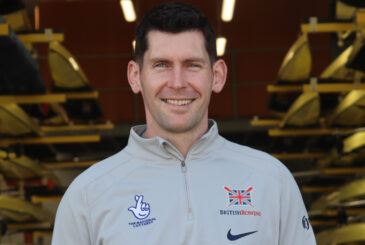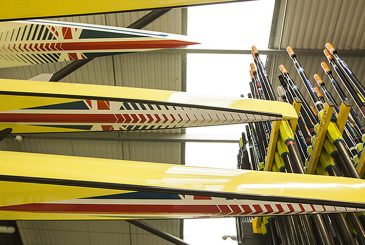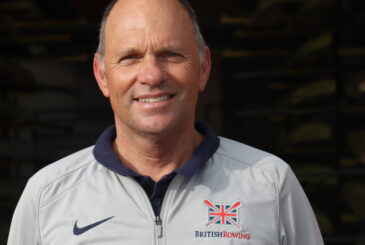Continuing our series celebrating some of the most dramatic Olympic and Paralympic finals since 2000, Martin Cross revisits the 2004 Games in Athens where the winners of the men’s four final was decided by eight-hundredths of a second
Alan Green, my BBC Radio 5 Live co-commentator, held his head in his hands. He had just called the 2004 final of the men’s fours for Britain ahead of Canada. But re-watching both crews surge for the line in search of Olympic gold, Green wasn’t so sure. He thought the Canadians had won. To be fair to Green many spectators were in the same position. That final was a magical contest that had ebbed and flowed down the course. And the drama of that race was equalled by the events leading up to it, notably with the British losing their key ‘three’ man, Alex Partridge, just six weeks before the Games.
I recently spoke to Ed Coode and Jake Wetzel. Both men rowed in the three-seat in that race on Lake Schinias. Ed retired after Athens, while Jake later went on to win gold with the Canadian eight in Beijing. They both relished talking about that historic encounter in 2004 and the events that surrounded it.
Jake: The genesis of the Athens campaign was in 2003. When I came onto the Canadian team the eight were world champions. It was basically a closed boat, and so our four were all people who came into camp after the eight have been formed. We beat the Germans in Lucerne and went on to win the World Championships in Milan. At that time, the Canadian team was undeniably the best sweep country in the world. But we knew that things would happen to the British four after the pair of Pinsent and Cracknell finished out of the medals in Milan.
Ed: When Matthew and James lost [finishing fourth in the pair at the 2003 Worlds], we knew it was going to put a hand grenade into the squad. No one would be safe in the fall out. I think the squad had a pretty good winter over 2003/2004, but it felt like there was a lot of uncertainty. We knew that Jürgen [Grobler] wasn’t prepared to settle for a silver medal in the men’s four – like they’d won in Milan – but that four wanted to stay together.
Jake: And there was a point in the winter, when Mike [Spracklen] brought us in and said what are we going to do? I just said: ‘We’re world champions, we’re defending it, no matter what! And, if a new British four comes and think they’re gonna get an easy ride. No way!’.
“Our impression of you guys was that you just took no prisoners”
Ed: After coming back from injury, I wasn’t even on the agenda to be considered for the four during the Seville training camp.
Things for me got worse in final trials. My pair didn’t even win the B final, and I quit. I mean, I said, you know, that’s it. My dream has come to an end, and I pretty much had a week off. And, then James Cracknell had a bad back before the first World Cup regatta in Poznan. I got asked by Jürgen to sub in. The only thing that I could do was work well in tandem with Matthew [Pinsent]. We won in Poznan and after that Jürgen put me in the eight.
Jake: We won at the Munich World Cup and then went on to Lucerne. The US team put their strongest guys in the four. We ‘doored’ them in the heat. In the semi – they didn’t do anything particularly special. We were totally focused on GB in the final. The US was on the outside. We’re well up on the GB four, and then out of nowhere, the US sprint through and wins. That was a blow for us.
Ed: Straight after Lucerne, Alex Partridge got diagnosed with a collapsed lung. And Jürgen said, Ed, I want you to come and row in the four. It was another kind of bombshell moment.
I mean it was all thoughts on Alex. It was really scary at that point that he was in hospital – he had a hole in his lung. Was he going to be okay?

But Matthew really did lead us at that moment. He said something along the lines of: ‘When I heard about Alex, I thought, well this is it. No one can expect me to win now, all the pressure’s off me. We’re just going to go for a medal’.
But Matthew couldn’t sleep. He said: ‘I thought we’re not going to do that, you know. I can’t let myself off the hook, just at this last stage. We’re going to win this, or nothing; we’re not just going to hand it to the Canadians’.
Jake: Our final camp was in Italy. We knew it was never going to feel great because of all the pressure and all the other things that were going on. That extra little bit of mojo was missing at that point.
Ed: I had my absolute low in April, and I didn’t feel under so much pressure. I felt it was the Canadians who were the favourites. On training camp, we did a 1,250m – it was really ambitious, and we nailed it. We came off that in a really good place going into Athens. The heats went well enough. And then, we had those semis. We were on different sides of the draw and our splits times were the same.
“I had a lot of reflection on ‘where did we lose those eight-hundredths of a second?’”
Jake: Yeah, they were identical the whole way down. And the interesting part about it was that in the heats, our eight got blown out by the US and the stroke pulled a pec muscle, so, all of a sudden, the eight was in disarray. The pair then got disqualified. And our team were just totally on edge. And we were just like, you know what, we’re just putting our blinders on. Our semi was okay, but not great.
Ed: I had exactly the same response to our semi-final. You know the splits were really close. It wasn’t a great semi-final from us, but I thought we can win this.
Jake: We thought we could win too. But we also thought that we’re not going to win this, if we don’t leave room to come up, in the last 500m.
The thing was, we always had a pretty good start, but we had been getting off and not really getting down and settling. We made all our time on the field from 400m to 1,250m where we were really good. So, interestingly, we were like, okay, that’s going to be the most crucial part of the race and if we give up a little bit in the first 500m, we’re going to be so much better off because we’re going to have somewhere to go.
Ed: I loved that lake and the surroundings in Greece. It was an extraordinary kind of cauldron. In the last few days, it was Steve and myself doing the basics, just trying to lead Matthew and James, and get them in the right place because they felt so under pressure.
Jake: And what I find amazing about it is that if you talk about an historic place to have a regatta, that is where the marathon starts. What a mano a mano place to have a race. It gives me goosebumps to think about it.
Ed: Our impression of you guys was that you just took no prisoners. Crews slow down a bit after the first 400m or 500m, but you shot out at that point and our race plan was about keeping you under pressure. So, we felt we needed to hang on to you and, as a consequence, we were suddenly slightly ahead at the halfway mark, and it felt like, well, that had gone pretty easily for us at that point.
Jake: After the 1,000m, we started moving. And I felt we would move a lot. And then when I watched the video afterwards, there wasn’t that much in it. This is how I imagined that it was going to unfold. And we were coming into the last bit. We’re in really good shape, we’ve moved out, we’re starting to take the advantage. And then, it shifted back the other way, but it wasn’t like we were done.
Mike had said if we get towards the end and the crowd’s too loud or something, our ‘two’ man Tom [Herschmiller] should just yell ‘PANIC!’. You have to rely on your instincts and you have to go. It was super-funny because we’re coming into the end and we’re behind and the crowd was super-loud. I yelled to Barney: ‘Be the man!’ We were in the last 250, I don’t even know how he heard it, but at that point it was just like our whole energy was surging, surging, surging and we’re coming back through. Well, you know how it ended…
Ed: Pretty much a dead heat.
Jake: Yeah, yeah, pretty much, a dead heat – I mean it’s crazy to think about how close it actually was.
Ed: It was, and I do actually remember that we were expecting you guys to lead out through the first 1,000m. But my memory of the actual race was just that they’re right beside us, and this is a really close race.
I remember that from our very simple race plan the night before – because we were still building this crew and we had to keep things quite simple – and it was, we’re going to go with 400m to go, not our traditional 300m. Somebody said if we’re leading with 10 strokes to go, we’ll be leading at the end, and we so nearly threw that one away. The last 10 strokes were a scramble. It felt like we had thrown it away in the same way that I felt like I’d slightly thrown away our 2000 Olympic final. Then I heard the noise of the crowd.
Jake: In a rowing race it feels like you either have your foot on someone else’s throat, or they’ve got it on yours, and this didn’t have that at all. But there was no point in that, where I was like, oh they’re really hurting – we were just trading blows.
Ed: I thank my lucky stars I was involved in that race. It was the perfect kind of rowing race. Obviously, by a few inches, it was a little more perfect for us.
“I think everybody who was part of that race felt like a part of something that was bigger”
Jake: When we got to the end, I had no idea what had happened. We looked over to you guys and you looked at us. There’s no way to know. And I remember just hearing the roar. And then looking up and looking over and seeing you guys there with your hands up.
Ed: But you guys were amazing. I can’t imagine how much that hurt, and you came straight up to us, shoulders back, and said what a great race that was.
Jake: I think everybody who was part of that race felt like a part of something that was bigger.
I had a lot of reflection on where did we lose those eight-hundredths of a second? Should we have gone out harder at the start? I mean you can just kill yourself thinking about what happened.
If there’s one thing that I realised: you may think you were close, but in the end, it’s the years and years and years and years of experience that allow you to win those close ones. And, what’s interesting about it is that for the next four years, when I was in the eight, it changed my role and my experience of how I contributed to the leadership of that boat.
I think that all those experiences from that run we had in the four from 2003-2004 were the ones that allowed us to win the eight in 2008. But there was no doubt in my mind that the 2004 Olympic final is the highlight of my career.
Ed: You know it was really, really, really important for me, just for my own confidence and self-belief. And it was very important for me to be able to stand up with my head held high.
Jake: And I will say this Ed, I think you were the stability in that boat that really changed the flavour of it. You stepped in and provided something to that boat that it did not have before.
And it was a crazy thing. I know we’ve talked about the book the Boys in the Boat. I rowed at Cal [Berkeley]. They have this great rivalry with Washington. And in 2016, they named the PAC 12 rowers of the last hundred years. And it’s directly because of that race, and to a lesser extent Beijing I think, that I won the PAC 12 rower of the century. And I was like wow – this is a really neat thing!
Illustration: Syahrulhart / Fiverr



